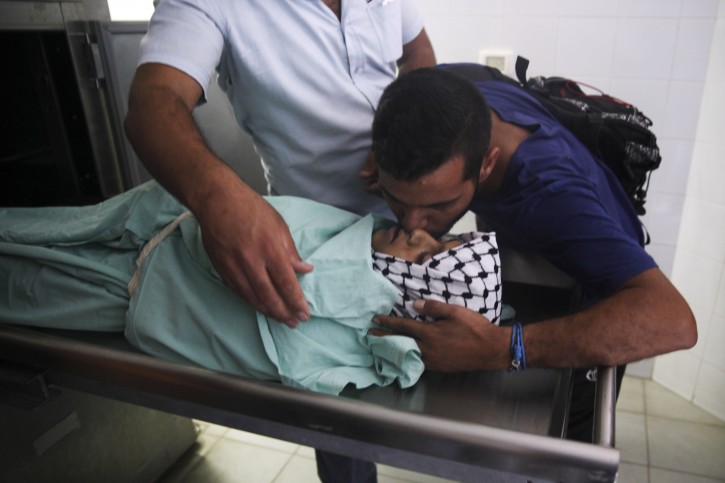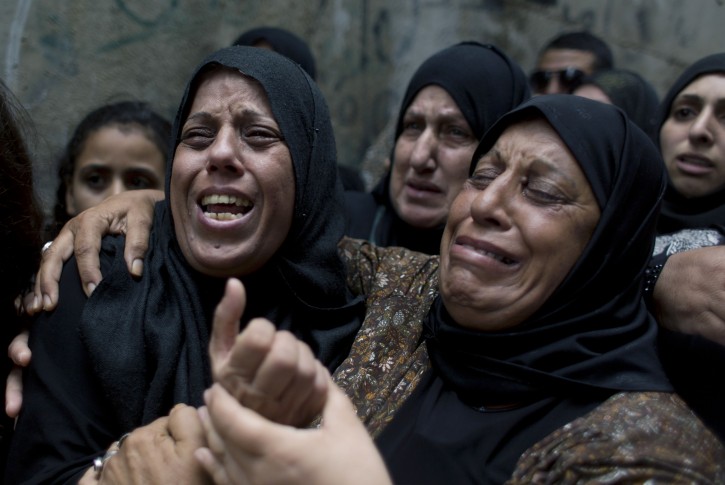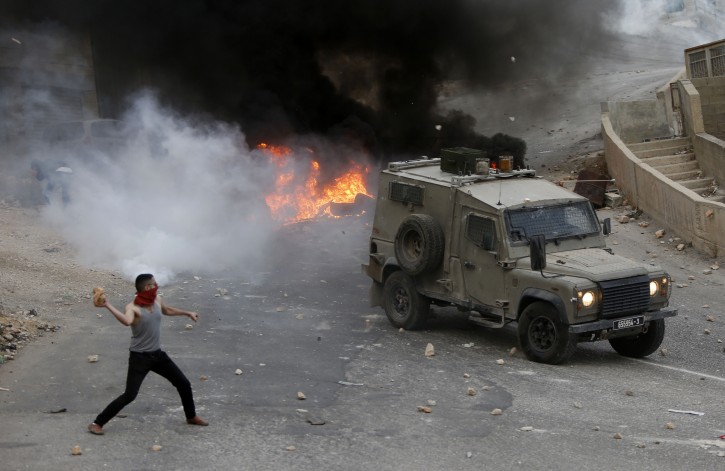
Jerusalem – Two Palestinian teens, including a 13-year-old boy, were killed by Israeli army fire in West Bank clashes Monday, raising concerns about a further escalation after a violent weekend that left several Israeli civilians dead and hundreds of Palestinians wounded.
The 13-year-old, Abdel Rahman Shadi, died after being hit by a live bullet to the chest while another Palestinian protester was wounded in clashes that took place at Rachel’s Tomb in Bethlehem, according to a doctor at the Beit Jala hospital.
The Israeli military confirmed troops opened fire, and said it was investigating further.
Earlier Monday, an 18-year-old Palestinian was killed in clashes in the northern West Bank town of Tulkarem, according to a doctor there. Both doctors spoke on condition of anonymity because they were not authorized to talk to the media.
In Tulkarem, hundreds of Palestinians – at a rally organized by the militant Islamic group Hamas – threw firebombs, rolled burning tires and threw rocks at soldiers who eventually opened fire after using tear gas and stun grenades, the Israeli military said.
The latest surge of violence comes at a time when most Palestinians no longer believe in the possibility of statehood through negotiations with Israel. At the same time, Palestinian President Mahmoud Abbas has not charted an alternative path to independence.
Gaps remain vast between him and Israeli Prime Minister Benjamin Netanyahu on the ground rules of negotiations, and the two have been trading blame.
The diplomatic deadlock has been accompanied by rising tensions at a key Jerusalem shrine revered by Muslims and Jews.
On Sunday, the Israeli government to take unprecedented security measures. As of Sunday, it barred Palestinian residents of Jerusalem from entering the Old City for two days during a Jewish holiday, in an attempt to curb Palestinian attacks. Palestinians who live, work and study within the Old City, as well as Israelis and tourists, are allowed in.
Israeli police said Palestinians threw rocks and firebombs in mostly Arab areas of Jerusalem in the night from Sunday to Monday. The Palestinian Red Crescent said over 450 Palestinians were injured in the violent protests over the last two days.

Much of the recent violence has stemmed from tensions at the sacred hilltop compound, which has been a frequent flashpoint. Its fate is a core issue at the heart of the Israeli-Palestinian conflict. It is known to Jews as the Temple Mount, site of the two biblical Jewish temples. Muslims revere it as the Noble Sanctuary, where they believe the Prophet Muhammad ascended to heaven.
There have been several days of clashes at the site over the past few weeks as Palestinians barricaded themselves inside the Al-Aqsa mosque while hurling stones, firebombs and fireworks at police. The unrest later spread to Arab neighborhoods of east Jerusalem and to the West Bank.
The Israeli ban came hours after a 19-year-old Palestinian, Muhannad Halabi, attacked an Israeli family as they walked in the Old City, killing the father, seriously wounding the mother and lightly injuring their 2-year-old toddler before proceeding to stab another Israeli man to death. He then opened fire at tourists and police before he was shot and killed by policemen who had rushed to the scene.
Halabi’s comments on Facebook prior to the attack, along with a similar post by another attacker, have added to fears and public debate over whether the specter of another Palestinian Intifada, or uprising, is on the horizon
“What’s happening to our holy places? What’s happening to our mothers and sisters in the Al-Aqsa mosque,” Halabi posted before the stabbing attack. “We are not the people who accept humiliation. Our people will revolt.”
Israeli officials, however, insist that Israel is not facing another Intifada but rather a “wave of terror.”
The stabbings were the latest in a series of deadly Palestinian attacks. On Thursday, suspected Palestinian gunmen killed an Israeli couple in front of their children as they drove in the West Bank.
An Israel died when his car was pelted with stones last month and there have been numerous incidents of Palestinians attacking Israelis and throwing stones at passing vehicles.

Netanyahu convened an emergency meeting of top security officials on Sunday, after which he declared that “additional steps to deter terror and punish terrorists.”
Israel has blamed Palestinian leaders for inciting violence over the Jerusalem holy site. Abbas phoned U.N. Secretary-General Ban Ki-moon to “brief him” on the unrest, according to his office.
U.N. Secretary-General Ban Ki-moon is calling for Israel to investigate the death of four Palestinians, including a 13-year-old boy, in recent clashes between Palestinian demonstrators and Israeli forces.
Ban says Israel should conduct a “prompt and transparent investigation” into the killings, looking into whether Israel’s use of force was proportional. He says he is “profoundly alarmed” by the recent events.
Israel’s army says it is “thoroughly” investigating the death of the 13-year-old Palestinian. It would not elaborate.
Ban also criticized Israel’s demolition of homes belonging to two Palestinian militants in east Jerusalem who killed Israelis in attacks, saying the measure would “inflame tensions still further.”
As reported by Vos Iz Neias
